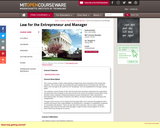
Copyright Infringement and Intellectual Property Slideshow
- Subject:
- Career and Technical Education
- Criminal Justice
- Material Type:
- Interactive
- Provider:
- Michigan Virtual
- Date Added:
- 07/29/2019

Copyright Infringement and Intellectual Property Slideshow

Here you can find a Guide, addressed to teachers on the use of storytelling and of the videos produced for training purposes, within the project DIST.
An E-course addressed to trainers on how to enhance the sense of initiative and entrepreneurship in their students,
2 E-courses, one addressed to aspirant entrepreneurs and one addressed to entrepreneurs, to enhance their sense of initiative and entrepreneurship.
Some Videos featuring young and valuable European managers telling their professional history.
Other information about the DIST project here www.distproject.eu

If you are an entrepreneur, one of your priorities, in addition to building your company, is ensuring you have enough money at the right times. Early Stage Capital will consider a broad range of questions that entrepreneurs deal with on this front, including the following: What should your strategy and your priorities be in raising early stage capital? What are the market norms and standards in structuring VC deals? What are the critical negotiating strategies and tactics? How will your company be valued? How can you obtain the optimal valuation for your new venture? What are the critical elements in the relationship between venture capitalists and entrepreneurs? How is the "venture model" evolving? Is it broken? What is the impact of Super Angels and micro VCs? These are key questions that face all entrepreneurs in 2010, particularly first-time entrepreneurs. This course aims to prepare you for these decisions, as either a potential entrepreneur or venture capitalist. Using live interactions with leading figures in the venture finance community, most of the class sessions will analyze fundamental strategies of the venture-capital investment process and the critical importance of the relationship between entrepreneur and investor. As well, we will have a tactical focus on demystifying the legalities and jargon of the term sheet and the "A round" financing process. Significantly for 2010, we will also frequently consider the rapid and arguably fundamental change in VC today as the "lean startup" model threatens much of the traditional role and value of the venture investor. Disclaimer: The websites for this course and the materials they offer are provided for educational use only. They are not a substitute for the advice of an attorney and no attorney-client relationship is created by using them. All materials are provided "as-is", without any express or implied warranties.

Entrepreneurial Finance examines the elements of entrepreneurial finance, focusing on technology-based start-up ventures and the early stages of company development. The course addresses key questions which challenge all entrepreneurs: how much money can and should be raised; when should it be raised and from whom; what is a reasonable valuation of the company; and how should funding, employment contracts and exit decisions be structured. It aims to prepare students for these decisions, both as entrepreneurs and venture capitalists. In addition, the course includes an in-depth analysis of the structure of the private equity industry.

How shall we judge the contributions to American society of the great financiers and industrialists at the end of the nineteenth and beginning of the twentieth centuries? In this lesson, students explore a variety of primary historical sources to uncover some of the less honorable deeds as well as the shrewd business moves and highly charitable acts of the great industrialists and financiers, men such as Andrew Carnegie, J. Pierpont Morgan, John D. Rockefeller, and Cornelius Vanderbilt.

An introduction to the study of Economics, difference between Macro/Microeconomics, and scarcity.

Provides a basic understanding of legal issues that corporations meet during their existence. Follows one firm throughout its life; from birth to bankruptcy, first as a breakaway from an established high-tech firm, then proceeding through initial funding efforts, establishment of its capital and corporate structure, and through problems in labor, trade secrets, contracts and antitrust, product liability, and resolution of transnational and domestic business disputes. This course provides a basic understanding of legal issues that corporations face during their existence. The course starts by providing the basic building blocks of business law. We then follow a firm through its life cycle from its "breakaway" from an established firm through it going public. The materials covered during 15.647 (the first half of the semester) emphasize the organization and financing of the company. In the second half of the course we examine a broad array of law-sensitive issues relating to intellectual property, product development, M&A transactions, international trade, the duties of directors and officers, business disputes, and bankruptcy and reorganization. The goal of the course is not to impart technical legal skills, but to enhance the judgment which students will bring to their responsibilities as entrepreneurs, managers in established companies, or consultants and advisors. There are two take-home exercises, and no exams.

The focus of this lesson is learning about the advantages and disadvantages of different kinds of renewable energy resources and their potential use in Michigan. Students read about different renewable resources, watch a teacher demonstration, and match different kinds of energy sources with the advantages and disadvantages of each. Students then compare the advantages and disadvantages of renewable and non-renewable resources and use the comparisons to write a letter to their state legislators.

Microeconomics provides an introduction to economic principles and market forces including supply and demand, labor and financial markets, elasticity, consumer choices, cost and industry structure, competition, monopoly, negative and positive externalities, economic inequality, financial markets, international trade, globalization and protectionism.

Examine a collection of primary source documents about automobiles in American history.

With this free video resource, students will be exposed to the economic way of thinking. Students will understand how to use economics in their lives and, ultimately, you’ll see the world differently-- all through engaging Hollywood production style videos.
Educators can use MRU's videos in a variety of ways, to include “flipping” the classroom, as study aids, supplementary material, concept reinforcement, or even as a full course offering.
In MRU's Principles of Microeconomics course, covers fundamental concepts like supply and demand and equilibrium. We also answer questions such as: How are prices determined? What did Adam Smith mean when he said the market process works like an “invisible hand”? How is it that we have access to fresh roses in very cold cities every Valentine’s Day? All key topics are covered to include competition, monopoly, price discrimination, externalities, public goods and more.
There are no prerequisites for this course, and it is accessible to beginners.
------------------------------------
What is Marginal Revolution University (MRU)?
Many of us can remember our first great economics teacher who fundamentally changed how we see the world. At MRU, we try and deliver that experience to millions worldwide through video.
Founded as a nonprofit in 2012 by George Mason University economics professors Tyler Cowen and Alex Tabarrok, MRU is building the world’s largest online library of free economics education videos -- currently weighing in at more than 800 videos.

Subject provides a conceptual framework for thinking about taxes. Applications covered include mergers and acquisitions, tax arbitrage strategies, business entity choice, executive compensation, multi-national tax planning, and others. Aimed at investment bankers and consultants who need to understand how taxes affect the structure of deals; managers and analysts who need to understand how firms strategically respond to taxes; and entrepreneurs who want to structure their finances in a tax-advantaged manner.